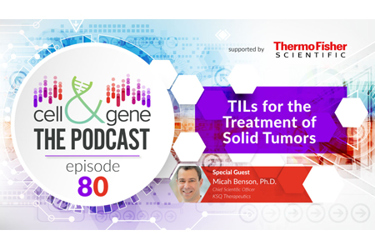Regulatory T Cells & Autoimmune Disease

By Erin Harris, Editor-In-Chief, Cell & Gene
Follow Me On Twitter @ErinHarris_1

Cell & Gene: The Podcast features some of the CGT sector’s brightest leaders who share their expertise on the timeliest topics and trends. If you can’t tune in to every episode, I’ve got you covered. Here are highlights, quotes, and more from a recently aired episode.
The Episode:
TILs for the Treatment of Solid Tumors with KSQ Therapeutics' Micah Benson, Ph.D.
Guest At-A-Glance
Micah Benson joined KSQ at its founding and was responsible for building KSQ’s Immuno-Oncology and Autoimmunity efforts, leading to a clinical-stage portfolio of multiple first-in-class therapeutics. A co-inventor of KSQ’s foundational Immune CRISPRomics® platform, Micah's work led to the discovery of SOCS1 and Regnase-1 and the development of KSQ’s eTIL® programs, including KSQ-001EX and KSQ-004EX, as well as a broad strategic partnership established with Takeda to develop and commercialize novel Immuno-Oncology therapeutics. Prior to joining KSQ, Micah served as the Head of Tolerance Therapeutics in the Immunology and Inflammation Research Unit at Pfizer, Inc., where he was responsible for building and leading a drug discovery portfolio and identifying external research opportunities focused on immune tolerance induction therapeutics. He earned his PhD in Immunology from Dartmouth Medical School where his work on B cell survival and T regulatory cell differentiation generated fundamental insights into the mechanisms of immune-mediated diseases. Micah subsequently served as a Leukemia Lymphoma Society fellow at Harvard Medical School where he studied mRNA splicing in B lymphocyte differentiation. He is the author of several patents and multiple publications in top-tier scientific journals.
Organization At-A-Glance
Located in Cambridge, MA, KSQ Therapeutics is a clinical-stage, privately held biotech using its genome-wide CRISPRomics® approach to develop cancer therapies. CRISPRomics is a genome-scale precision functional genomics platform that pinpoints therapeutic nodes that directly correlate genomic function to disease with unprecedented certainty and speed. The company is deploying CRISPRomics for novel drug development across broad therapeutic areas and is currently advancing a proprietary pipeline of tumor- and immune-focused drug candidates.
Episode Highlights
Engineered Tumor-Infiltrating Lymphocyte (eTIL®) for the Treatment of Solid Tumors
According to KSQ, Tumor-Infiltrating Lymphocytes (TIL) are an ideal therapy for the treatment of solid tumors, as they are a patient’s personalized immune response against cancer cells and possess broad, polyclonal T cell receptor-mediated recognition of cancer cells. This polyclonality provides TIL with the potential to eliminate every last cancer cell, even if the cancer cell evolves. In fact, the first TIL therapy has now been approved in the U.S. for the treatment of melanoma. Despite this promise, however, for many patients, TIL therapy unfortunately falls short. KSQ seeks to maximize the tumor-killing activity of TIL therapy by knocking out top CRISPRomics-discovered targets, SOCS1 and Regnase-1, in TIL using CRISPR/Cas9 gene editing creating eTIL® therapies. In the animal models to date, inactivation of Regnase-1 and SOCS1 has demonstrated a remarkable ability to boost the ability of T cells to infiltrate and kill tumors, even in settings where no other therapies work.
By engineering into each TIL best-in-biology anti-tumor activity, Benson and his team believe eTIL therapies may solve the intractable efficacy obstacles facing patients currently receiving T cell therapies in the treatment of solid tumors.
Treating Autoimmune Disease
During our discussion, Benson notes that while KSQ has focused its CRISPRomics approach to develop novel therapeutics for the treatment of cancer, the team has also been quietly active in evaluating opportunities in autoimmune with its CRISPR screening approach. KSQ positioned the CRISPRomics screening approach to identify and develop novel therapeutics for two mechanisms, one to directly kill cancer cells, the other two enhance the ability of the immune system to kill cancer cells. He notes it may seem simplistic enough if we think about the mechanisms at play with autoimmunity. Yet, there is, in fact, a great deal of complexity in the mechanisms that drive autoimmunity.
Top Quotes
6:35 [Regarding KSQ’s CRISPRomics platorm] “What does industrialized genome scale CRISPR/Cas9 screens mean? We believe that the use of CRISPR is similar in gene editing approaches and its ability to serve as a tool to uncover biological truth will have just as much impact, possibly more, to the use of genome editing in a clinical setting as a therapeutic modality is probably the most powerful tool that biologists currently have in their arsenal. I think back to my own time at the bench when I was a grad student and a postdoc. I really wish I had this tool to be able to query the function of genes in the various cells that I was studying, and I'd probably place that up there at the same level important as DNA sequencing and PCR in terms of impact.”
32:08: [Regarding autoimmune diseases] “Even within a particular autoimmune indication, there’s a whole lot of complexity and heterogeneity within those patients, certainly with the mechanisms driving disease. So rather than investigate those mechanisms that inhibit the immune system directly, what we instead wanted to do was investigate mechanisms which can broadly boost the negative regulators of the immune system. And there's a very good cell type, which you can do exactly that with – the T regulatory (Treg) cell.
33:07: [Regarding the Treg cell] It's a type of T cell that is incredibly immunosuppressive. And it basically exists with the sole purpose of preventing our immune systems from attacking themselves. It’s been heavily implicated in autoimmune diseases, and I think there has been a lot of activity and excitement in trying to invoke ways to help boost the ability and the functionality of these T cells to help resolve autoimmune diseases.”
There’s More Where That Came From
The full-length episode covers enhanced genomics, KSQ’s Phase 1/2 clinical study, KSQ-001EX, and the future of treatment for autoimmune disease. Tune in here or wherever you podcast.
